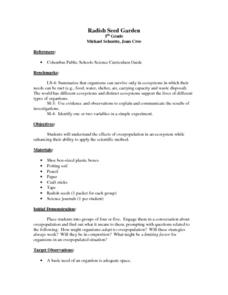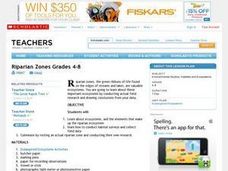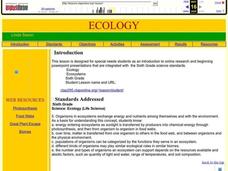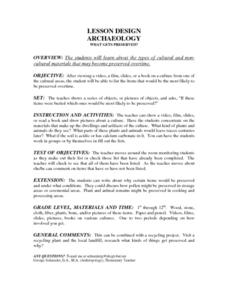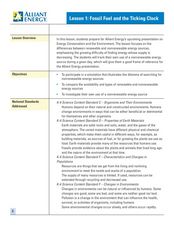Curated OER
Biotic Factors
Students identify individual organism, a species, and a population within the study community. They identify biotic factors at the site and attempt to characterize the site's species diversity.
Curated OER
Wetlands Project
Students analyze wetlands data and create a HyperStudio stack to present the information. In small groups they analyze the wetlands data already collected in a previous lesson plan, and construct a stack of cards using HyperStudio to...
Curated OER
Aquifers and Recharge Areas
Students create a model of an aquifer and describe how an aquifer works. They describe how running affects an aquifer and prepare a model presenting to local planners the important aspects of protecting recharge areas.
Curated OER
National Forests of Wisconsin and Puerto Rico
Fifth graders study the forests of Wisconsin and Puerto Rico. They view a Power Point presentation and predict slides to represent various forests in Wisconsin and Puerto Rico. They play a game to recognize differences and similarities...
Curated OER
Ecology of the Dump
Middle schoolers recreate landfills in petri dishes, observe relative biodegradability in a year-long project, and isolate a cellulose degrading bacteria while discovering the need for recycling and the serious problem waste management...
Curated OER
Radish Seed Garden
Fifth graders explore the effects of overpopulation in an ecosystem while applying the scientific method. They discuss overpopulation and its meaning. Students as an organism competes for space in an overpopulated area. They plant...
Curated OER
Air Quality and Transportation
Second graders study about air pollution and the effects it has on our Earth. Students tally cars on a sheet that has been categorized as follows: One person in car, two persons in car, or three or more persons in car. Students go to...
Curated OER
De"compost"ition Activity
Students investigate the decomposition process and the parameters which influence the rate at which it occurs. They design a "controlled" experiment by comparing decomposition rates between two compost piles. Analysis questions include...
Curated OER
Riparian Zones Grades 4-8
Students examine and analyze the Riparian Zones found on the edges of streams and lakes. They assess why those are such valuable ecosystems and then conduct actual field research on riparian zones and conclude by drawing conclusions from...
Curated OER
Ecology
Sixth graders are introduced to online research and beginning PowerPoint presentations that are integrated. They pass a plant and photosynthesis. Students locate information on a self selected animal online. They give a PowerPoint...
Curated OER
Archaeology What Gets Preserved?
Students view a video on a culture and list what would be preserved over time. In this investigative lesson plan students study preservation and what gets preserved in different cultures.
Curated OER
Spud Smear
Students study various samples of microorganisms in petri dishes. In this microorganism lesson, students place various samples of items in petri dishes and observe them after several days of incubation.
Curated OER
Fossil Fuel and the Ticking Clock
Young scholars study energy sources to learn about fossil fuels and environmental concerns. In this energy sources lesson, students watch demonstrations for various energy examples. Young scholars find hidden pennies, make a bar graph on...
Curated OER
Water Quality
Students play the role of scientists testing for water quality in the area. In this ecology lesson plan, students determine the water sample's pH, temperature, dissolved oxygen and turbidity. They write a journal reflection after the...







